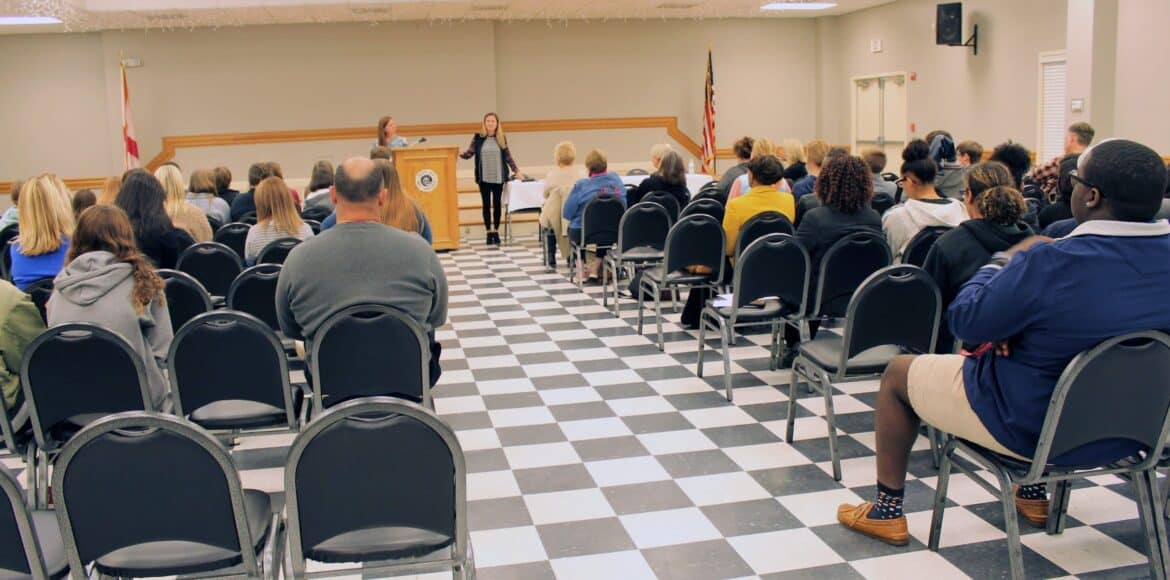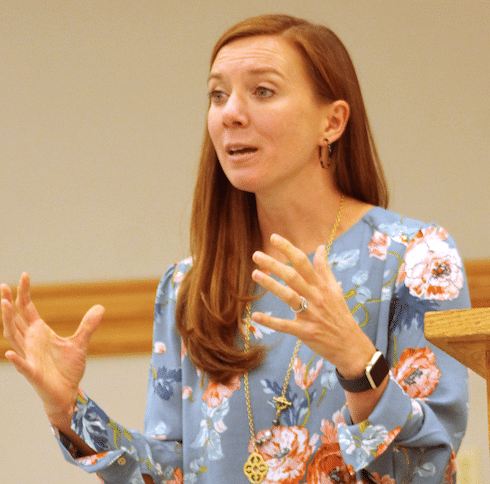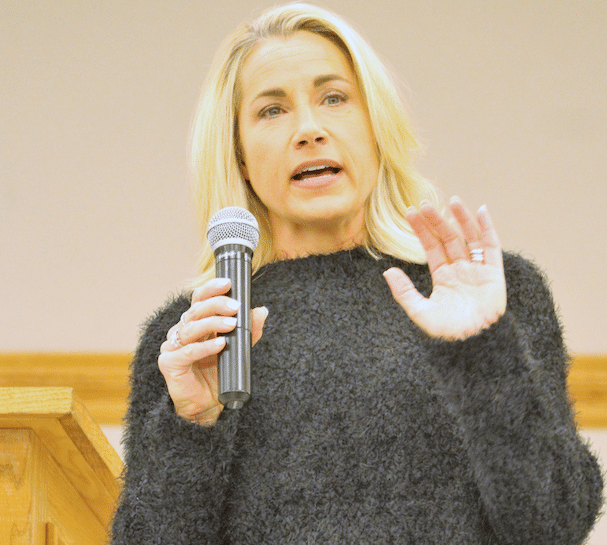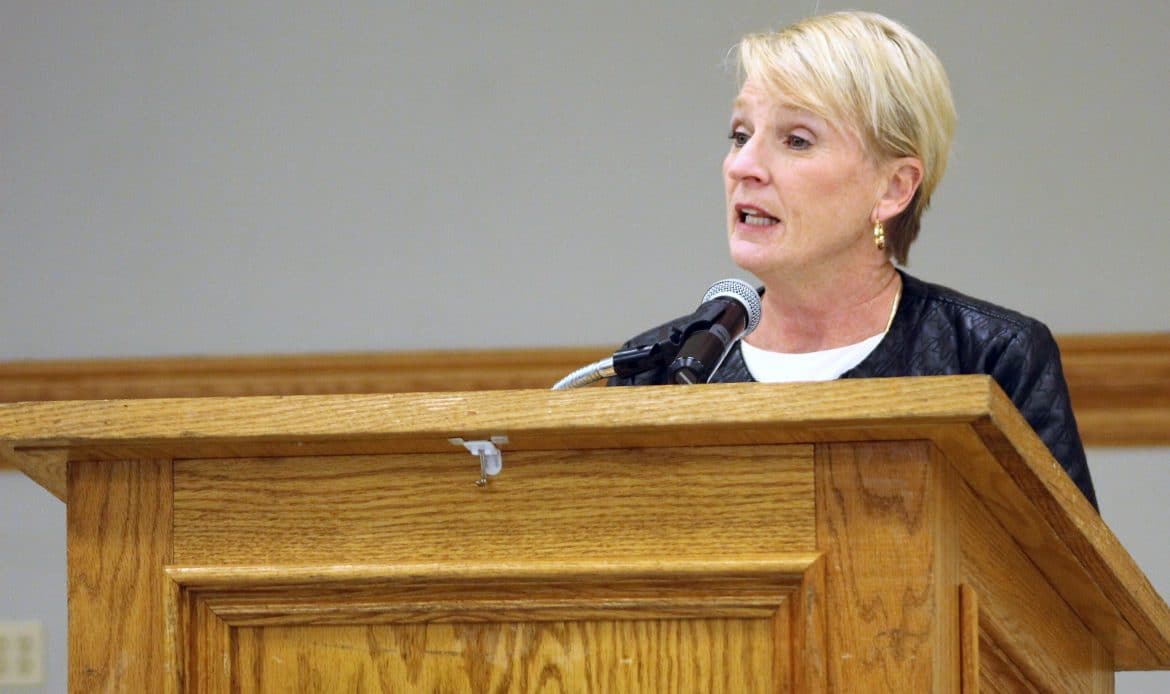By Gerri Miller
Staff Writer
Six minutes. That was all the time it took for 13-year-old Cole Ellis to take his life after greeting his mother on a school morning.
Rebecca Ellis told the story of her son’s suicide to a full house at the Millbrook Civic Center Wednesday night during a forum for suicide awareness and prevention. The program was sponsored by Millbrook First United Methodist Church and Robinson Springs United Methodist Church.
Ellis said Cole Ellis seemed to have the perfect life. The Trinity Presbyterian student was a gifted athlete who had just been named MVP for his football team. He was a straight A student who loved hunting with his father.
Cole was dressed for school. His father was already at work. His mother was getting ready to take Cole and his two sisters Haden, 16, and Emma, 10, to school. Before they ever got out of the door, Cole had taken his life.
“I remember going into counseling and nothing made sense,” Ellis said. “I kept asking myself ‘what did we miss?’”
“There were no signs with Cole,” Ellis said. “He never seemed depressed. He was just that kid that was always going, doing. We were a very close family. And there’s just no going back.
Before Cole’s death, Ellis had another parent approach her and tell her about some inappropriate text messages her daughter knew had been sent to Cole by another student. Rebecca said the girl had allegedly offered Cole sexual favors if he would be her boyfriend.
“Cole was carrying a lot of pressure-he had all of this adult stuff thrown at him at one time,” Rebecca said. “When we confronted him, he put up barriers.”
“The best we can tell with Cole, he was just overwhelmed with attacks on his integrity and decisions he had made and just feeling he had let others down,” she continued.
The family didn’t know of the texting situation they believe led to his death until about 72 hours before he died.
Teen suicide is a growing health concern. It is the second-leading cause of death for young people ages 15 to 24, surpassed only by accidents, according to the U.S. Centers for Disease Control and Prevention. In Alabama in 2017, 109 youth and young adults between the ages of 10 and 24 died by suicide with 71 of those deaths in young people ages 20-24, according to the Alabama Department of Public Health.
The national suicide rate among teen girls doubled from 2007-2015, reaching a 40-year high, according to a new analysis from the CDC.
From 1999 through 2014, the age-adjusted suicide rate in the United States increased 24 percent, from 10.5 to 13.0 per 100,000 population, with the pace of increase greater after 2006, according to the National Center for Health Statistics.
“Sometimes drugs or depression may be involved, but sometimes with teens it is just irrational behavior in an irrational moment in time,” Rebecca said.
Delta Kelly, a counselor with Hope City Counseling in Montgomery, said although behaviors will be different for everyone, there are some classic signs to look for to determine if an individual may be contemplating suicide. They include significant changes in the individual’s behavior such as someone who is laid back becoming aggressive, profound anger, mood swings or shifting personalities.
The main goal is to get the individual to talk to someone as well as to find the individual a compassionate, safe place to express what they are feeling, Kelly said. “Let them know that they will still be accepted and loved no matter what they have to say,” she said.
Kelly said you don’t have to be a professional counselor to help someone dealing with suicidal feelings-you just have to have empathy and compassion.
Hope City Counselor Alisa Jones said it is important to remove the stigma of shame that the person often feels in asking for help. “The shame ultimately makes them feel like something is wrong with them. We worry about disappointing our friends or believe that what we have done is too big to recover from. “
Mike and Rebecca Ellis established the Cole Ellis Foundation to provide counseling and other services for those who may need help. “Cole lived an incredible life and made a great impact on those around him. We desire to continue his legacy by helping adolescents, teens and young adults to live a healthy life and find their unique purpose,” according to the organization’s website.
Hope City Counseling has partnered with the Cole Ellis Foundation. Hope City is a Montgomery-based mental health counseling organization offering grace-centered Christian counseling.
For more information on Hope City Counseling, call (334) 721-3592. For information on the resources provided by the Cole Ellis Foundation, call (334) 300-0664 or visit thecoleellisfoundation.com.
Interested in a support group for survivors of suicide? Call Cheryl Vinson at (334) 322-5988 or email her at riverregionsos@gmail.com










